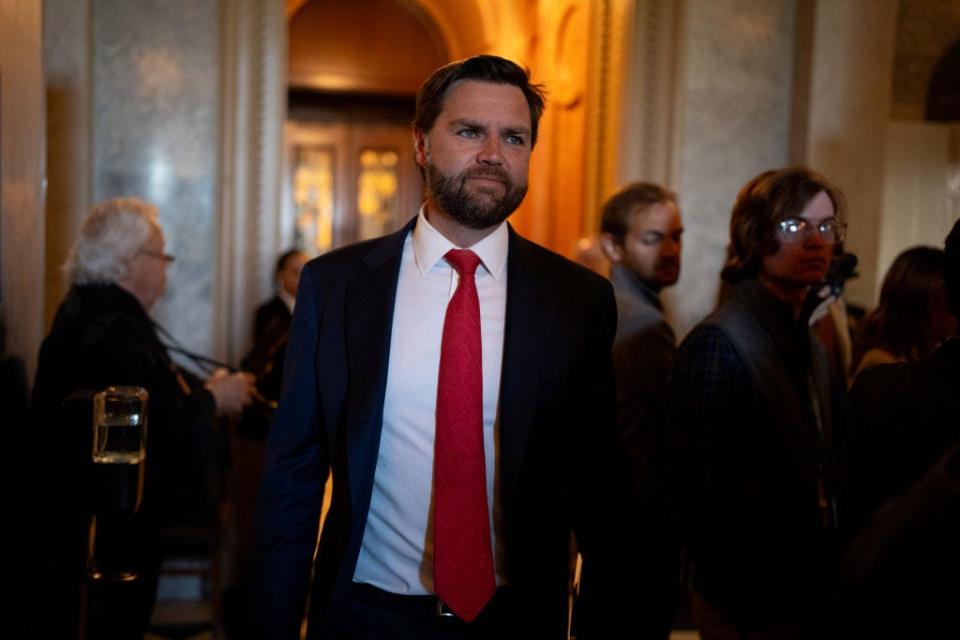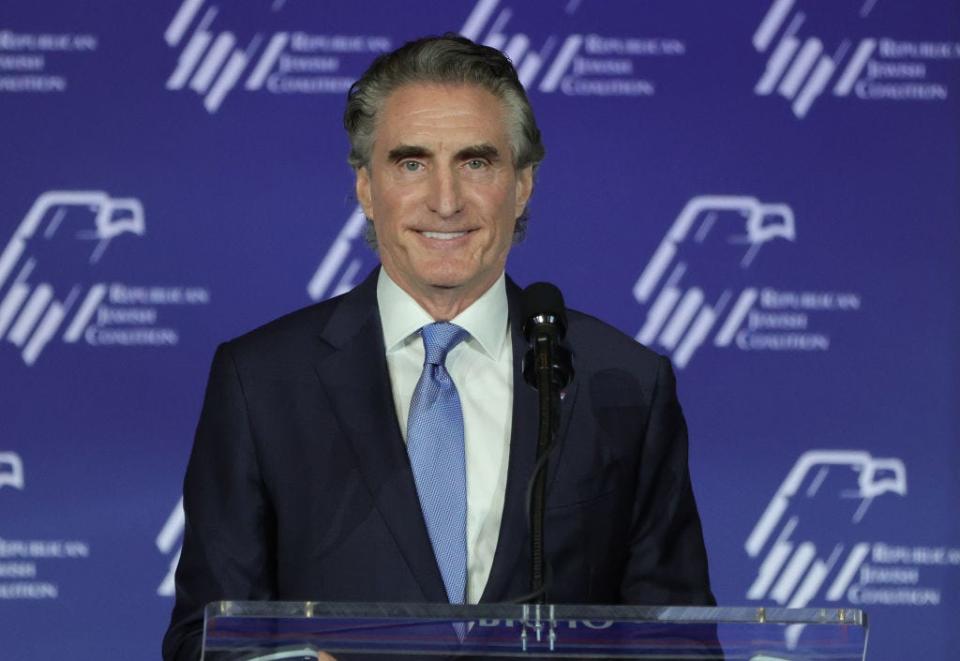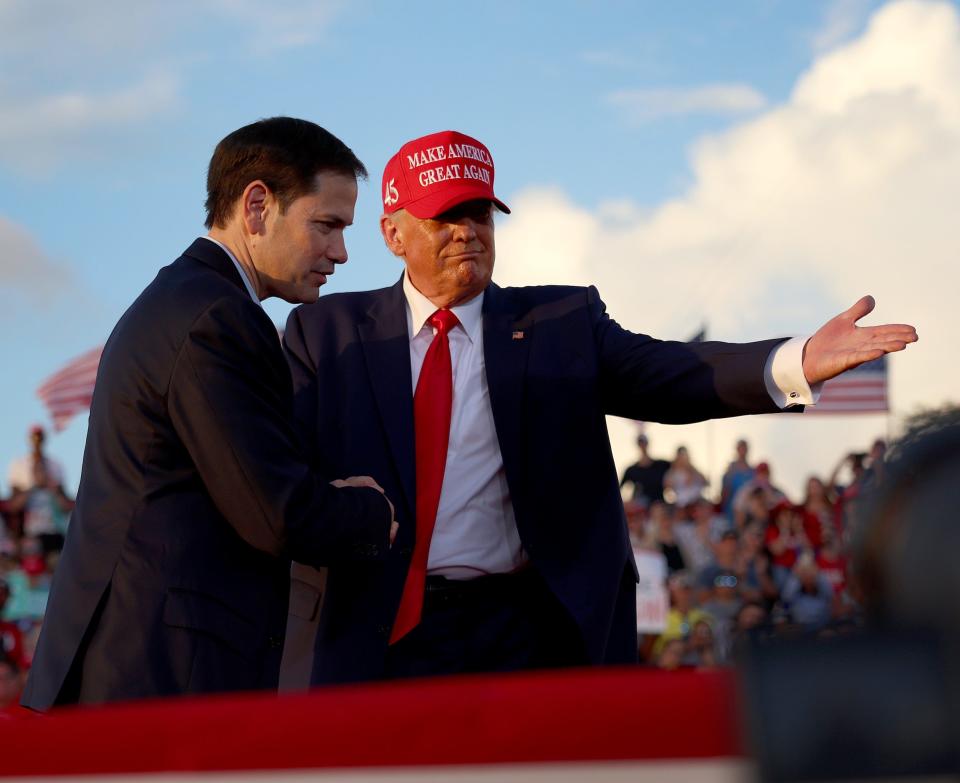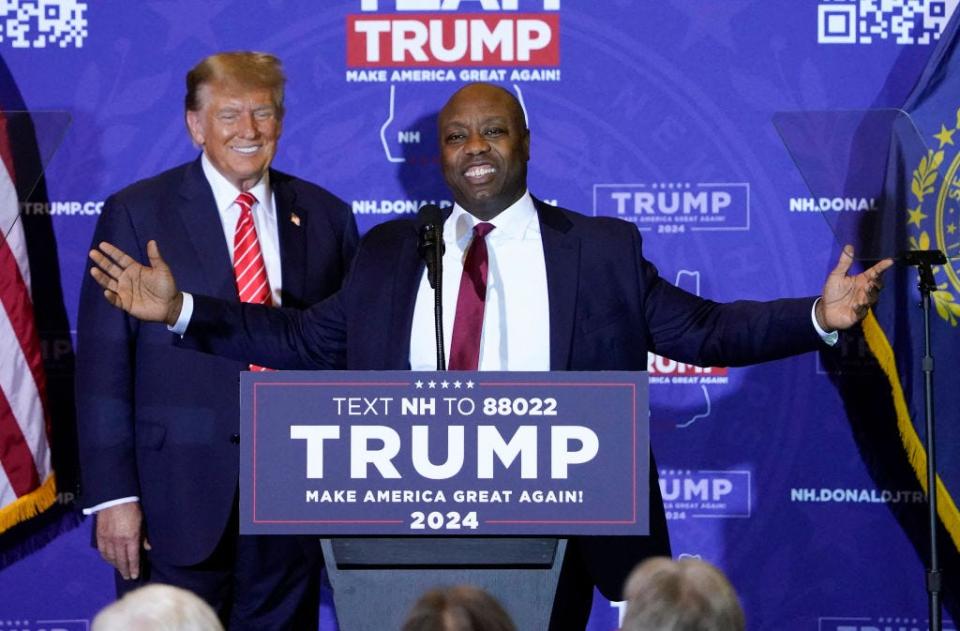A power ranking of Trump's potential vice presidents
Donald Trump is entering the home stretch of his vice presidential selection process.
The Republican National Convention kicks off in Milwaukee next week.
Trump has a lot of factors to weigh in his decision.
Former President Donald Trump is expected to name is running mate in less than a week, ending his vice presidential selection process.
According to multiple reports, Trump has likely narrowed his focus to the shortlist of North Dakota Gov. Doug Burgum, Sen. Marco Rubio of Florida, and Sen. JD Vance of Ohio. In the end, only Trump knows what will happen.
It's quite possible the former president could turn to someone else on the much larger list of names he once viewed as potential vice presidents.
Trump told Fox News on Monday that President Joe Biden's disastrous debate has factored in slightly into his decision, given the small possibility that Biden could drop out.
Even if he wins in November, Trump will reenter office as a lame duck. It means his apprentice will have the inside track to replace him in 2028 — a fundamentally different reality than the one he faced in 2016.
So, with that in mind, here's Business Insider's final vice presidential power ranking.
Here's where things stand:

1. Sen. JD Vance of Ohio (Previously 2)
Vance has been one of the biggest risers since our initial rankings almost two months ago. It's not hard to see why.
The 39-year-old has pivoted far beyond his "Never Trumper" past. He's now as close to Trump's base as any elected official. He's also reportedly close to Donald Trump Jr. Vance was also the first of Trump's possible vice presidential picks to go to Manhattan to show his support during the former president's historic criminal trial.
Vance hasn't been afraid to push Trump's worldview in a chamber that, unlike the House, is more likely to defy the former president. It's been an extraordinary rise since the Ohioian was sworn in just last year.
His selection would underline the expectation Trump would ensure his second administration is filled with loyalists. But Vance would likely do little to help Trump expand his appeal.
As a former venture capitalist, Vance has ties to the more conservative Silicon Valley leaders who could help buck up Trump's fundraising. Like many on this list, Vance has questioned the results of the 2020 election. He's gone even further recently by suggesting that former Vice President Mike Pence has overplayed the extent to which his life was under threat during the Capitol riot.

2. Gov. Doug Burgum of North Dakota (Previously 4)
North Dakota Gov. Doug Burgum spent his brief 2024 run paying supporters to donate to his campaign. His campaign's biggest moment was arguably when he injured his leg before a primary debate.
Despite that inauspicious moment and a forgettable primary effort, he's receiving serious consideration. Burgum's newness to the national scene remains his biggest obstacle.
Burgum has gained some key allies while under Trump's reported consideration. The Wall Street Journal Editorial board, often considered the voice of the GOP's establishment, is behind him. So, too, is Kevin O'Leary, the Shark Tank veteran. Other Wall Street types are also intrigued by his possibility.
Then again, Trump tried a Midwestern governor straight out of central casting who was not supposed to outshine him. Unlike Pence, Burgum blazed a path in business before getting into politics. The North Dakotan sold his software company to Microsoft for over $1 billion in 2001. As CNBC pointed out, Burgum could write a massive check to Trump's campaign.

3. Sen. Marco Rubio of Florida (Previously 3)
Florida, man. If Rubio represented any other state, he would be atop our list. That's because the biggest hurdle for Rubio isn't likely anything in his past. Instead, he faces very real concerns about residing in the same state as Trump.
As Politifact explained, the Constitution has been interpreted not to allow electors from the same state to vote for a president and vice president who also reside in that state. That means a Trump-Rubio ticket could lose out on Florida's 30 electoral votes, even if they won the state. According to the Bulwark, Rubio would be willing to move, but he might have to make up his mind soon.
Rubio would be the most obvious choice for a Trump pick poised to help the GOP hold the White House in 2028. After all, the Floridian was once proclaimed the future of the Republican Party.
He is not a MAGA-whisper like Vance, but the Floridian found ways other ways work with his former 2016 primary rival while in office. Rubio has also shown he'll shift his views, most notably he was one of the main architects of the bipartisan, sweeping 2013 immigration legislation that would have offered undocumented immigrants a pathway to citizenship.
Like many 2016 foes, Rubio is also on record hammering Trump — including his cringey mocking of the future president's hand size (Rubio later apologized for that).

4. Sen. Tim Scott of South Carolina (Previously 1):
Scott has been on Trump's shortlist from the beginning. He also led the other two editions of our power rankings.
He doesn't have the constitutional questions that Rubio would face. He has been on the national stage longer than Burgum. He could also expand Trump's appeal with a historic candidacy.
Scott behaved like he wanted the job, but it doesn't seem like he made the final cut. In early June, Scott's allied political action committee would spend $14 million targeting voters of color. He has shown fundraising prowess that could be greatly appreciated down the stretch of the general election. It helps that Scott has a relationship with Oracle co-founder Larry Ellison, who, according to CNBC, is pushing him to get picked.
The 58-year-old would also be a historic choice. He's already the first Black Republican elected from the South since Reconstruction. Some Trump aides have urged the former president to balance out his 2024 ticket by picking a person of color.
That all being said, we've talked up Scott before. And he dropped out before the Iowa caucuses.

5. Rep. Elise Stefanik of New York (Previously 5)
Stefanik has clearly staked her ground as a Trump ally. She was the first member of House leadership to have endorsed Trump for his 2024 run. She endeared herself to his political base for her defense of the president during his first impeachment trial. Stefanik garnered national attention recently for grilling college presidents over their handling of antisemitism. She was once more liberal than Rep. Liz Cheney of Wyoming, but her rise in the GOP has coincided with a reinvention as a Trump-aligned Republican.
The New Yorker hails from a state that is never going to back Trump. But scores of studies show that the home-state boosts for vice presidents isn't all it's cracked up to be. Perhaps it's not surprising then that none of the top-tier names on Trump's list hail from a current swing state. Still, Stefanik's selection would be historic. She would be only the fourth woman to share a major party's ticket. Republicans, especially Trump, have struggled with suburban women, but it's not clear that tapping a woman would automatically cure that problem.
Biden may also delight in the selection of a House GOP leader. The president has repeatedly called attention to the drama that has gripped the lower chamber. Voters are likely to care more about the economy than Speaker Mike Johnson's job status, but the level of in-fighting in the GOP is so bad that multiple sitting lawmakers have quit their jobs early.
The rest of the pack
6. Sen. Tom Cotton of Arkansas (Previously 7): Cotton's career is bookended by fights with The New York Times — mostly recently over his 2020 op-ed calling for Trump to invoke the Insurrection Act to quell riots in the wake of George Floyd's killing. The GOP senator was a loyal Trump ally, including defending the then-president's push to buy Greenland.
Unlike others on this list, Cotton notably did not vote against certifying the 2020 election. He was also harshly critical of one of Trump's biggest bipartisan achievements, the First Step Act, arguing that criminal justice reform failed to do enough to protect public safety.
7. Former HUD Secretary Ben Carson (Previously 6): Trump still has close feelings for his former Cabinet official. Carson also hails from the key state of Michigan. He's also still an avowed supporter of a national abortion ban, a topic Trump has tried everything in his power to avoid. Former White House chief of staff Mick Mulvaney thinks Carson will be picked because unlike other vice presidential hopefuls, he doesn't covet the top job.
8. Rep. Byron Donalds of Florida (Previously 8): Like Rubio, Donalds gets docked for the potential home state conundrum. Donalds has risen rapidly in the eyes of many of his House GOP colleagues. He has close relationships with the House conservatives that forced former Speaker Kevin McCarthy's historic ouster and have frustrated Speaker Mike Johnson, but he hasn't participated in either effort to challenge the men directly.
9. Gov. Glenn Youngkin of Virginia (Previously 10): Youngkin skipped out on a late 2024 run to focus on state legislative elections. The Republican was supposed to show how the GOP can talk about abortion in competitive areas. It didn't work out. Still, he has the personal wealth and connections to seriously help a Trump campaign. Plus, per CNBC, Rupert Murdoch likes him.
10. A wild card like Gov. Sarah Huckabee Sanders of Arkansas: Sanders would offer diversity to a ticket, something some Trump advisors said they wanted when this process started. She also cut a national profile for herself as White House press secretary.
11. Anyone else: Former Rep. Tulsi Gabbard of Hawaii and entrepreneur Vivek Ramaswamy are off our list, but either of them are less risky than someone who killed a dog.
12. South Dakota Gov. Kristi Noem (Still last): Noem could have been a contender. But when your top Google results are about dog killing, it's safe to say your chances are pretty much over. The prediction markets seem to think so, too.
Read the original article on Business Insider


